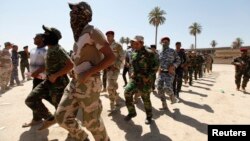Iraqi government TV reported that the 4,000 volunteers were being airlifted to Ramadi from the country's mostly Shi'ite regions of Karbala, Baghdad, Najaf and Basrah. It said Anbar province governor Ahmed Khalaf al-Dulaimi made the announcement in a statement Saturday.
Anbar province military commander General Rashid Flayeh indicated that around 2,500 of the volunteers had been flown into Ramadi Friday by helicopter. The rest were expected to be flown in Saturday. Government forces currently control Ramadi, although Sunni insurgents hold the Anbar town of Faluja, 25 kilometers from Baghdad.
A spokesman for Iraq's top Shi'ite cleric, Grand Ayatollah Ali al-Sistani, urged volunteers and regular army forces to respect the rights of Iraqi citizens in regions where they are fighting, no matter what their sectarian, ethnic or political affiliations may be. Sheikh Abdul Mehdi al-Karbalai made the plea in a sermon Friday.
ISIL Attacks in Iraq
ISIL Attacks in Iraq- June 10: Mosul captured
- June 11: Tikrit and parts of Beiji captured
- June 12: Samarra and Dhuluiya captured
- June 13: Jalawla and Saadiyah captured
- June 14: Clashes in Ishaki and Dujail
- June 16: Tal Afar captured
Ayatollah Sistani issued a religious edict last month calling for volunteers to defend Iraq from Sunni ISIL militants who have captured large chunks of the country north and west of the capital, Baghdad. Increasing acts of sectarian violence, both by Sunni ISIL militants and by mostly-Shi'ite government forces have been reported in recent days.
The mostly-Shi'ite Iraqi government forces are under pressure from Sunni militants, as well as Kurdish Peshmerga fighters. Peshmerga fighters took control Friday of two major oil fields south of the contested town of Kirkuk from government forces. Peshmerga fighters captured Kirkuk itself from the government last month.
Kurdish leaders have been locked in a tug-of-war with the government of Prime Minister Nouri al-Maliki over oil revenues since late last year. Falah Mustafa Bakir, who heads the foreign relations department of the Kurdish Regional Government, blasted the Maliki government and defended the Kurdish seizure of oil fields.
“Unfortunately, since the beginning of this year, Prime Minister Maliki unilaterally and unlawfully has cut the budget of the Kurdistan region and stopped sending the payment of salaries of civil servants," he said. " We are obliged to take action in order to provide services and pay the salaries of the people.”
Neighboring Turkey has agreed to allow Kurdistan to pump its oil via Kirkuk to the Ceyhan pipeline over its territory. It is not clear, however, how Turkey will ultimately react if Kurdistan goes ahead with a possible move toward independence from Baghdad.
Middle East scholar Gary Sick of Columbia University told VOA that Kurdistan is strategically hemmed in by its more powerful neighbors, who are not likely to look favorably on Kurdish independence.
"The big problem with Kurdistan is that it is surrounded by a group of countries who have no interest for the most part in seeing a really independent Kurdistan," Sick said. " And, also, economically they are isolated. They basically have one product to get out and that's the oil from the oil fields in the north. They have no way to get it out except through Turkey, which means in effect that Turkey can dictate to them at any point what they want to do.”
Sick said Iran is also concerned about potential Kurdish independence, due to its own Kurdish population. Iran, he argues might decide to put pressure on the Kurds by refusing to allow the passage of goods across its border.
In other developments, ISIL militants reportedly fought Iraqi government forces inside the strategically located town of Haditha. The government beat back the ISIL attackers Saturday, amid worries that a major dam outside the town could fall to the militants. ISIL flooded surrounding towns earlier this year after it captured another Anbar province dam.











